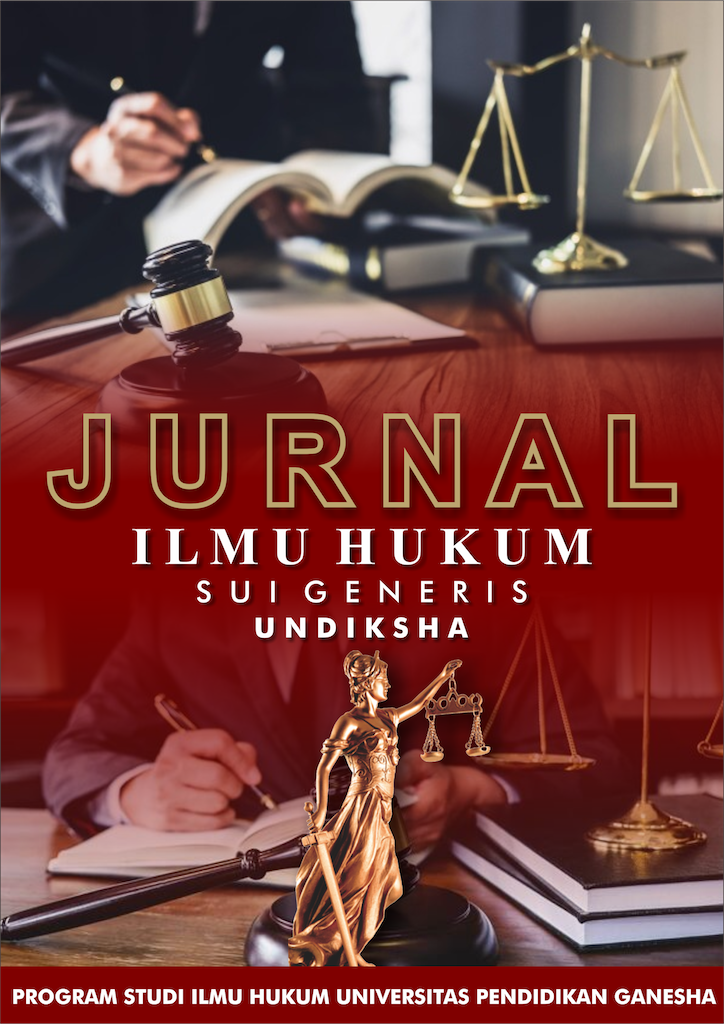TINJAUAN YURIDIS KEABSAHAN MATA UANG CRYPTO (CRYPTOCURRENCY) BERDASARKAN PERSPEKTIF UNDANG-UNDANG NOMOR 7 TAHUN 2011 TENTANG MATA UANG
Kata Kunci:
mata uang, cryptocurrency, legalitasAbstrak
This study aims (1) to analyze legal arrangements regarding cryptocurrencies as a reference in providing legal certainty for the use of cryptocurrency in Indonesia, (2) identify the validity of cryptocurrencies based on the perspective of Law Number 7 of 2011 concerning Currency.The type of Penlitain used by researchers is normative legal research, namely through a statutory approach, and a conceptual approach. The sources of legal materials used are the 1945 Constitution, Civil Code, PERPRES, Permendagri, Bappebti, and PBI. The results showed that (1) Juridically normatively, Indonesian law already has provisions or regulations regarding "crypto money". This shows that the government has the awareness to create the rule of law in a new atmosphere of the development of human economic activities in the digital era. It's just that in its normative provisions, there are still conflicting perspectives in looking at crypto money. (2) The legality of using Bitcoin as a medium of exchange to replace rupiah in Indonesia is an illegal payment. In terms of the perspective of Indonesian law, it should be clear that the legitimacy of Bitcoin should not be used as a medium of exchange in e-commerce transactions in Indonesia and/or marketed in Indonesia. However, the Indonesian government through (Bappebti) has established and legalized cryptocurrency as a commodity asset that can be traded on the Futures Exchange as a Crypto Asset. Keywords: currency, crypto, legality.
Referensi
Kelly, B. (2018). The Bitcoin Big Bang (Bagaimana Mata Uang Alternatif Akan Mengubah Dunia). PT. Elex Media Komputindo, Jakarta.
Mankiw, G. (2006). Teori Makro Ekonomi, edisi enam. Jakarta: PT. Gelora Aksara Pratama
Muhammad, A., & Niaga, H. P. (2004). Hukum dan Penelitian Hukum. Bandung: PT. Citra Aditya Bakti. Rokhmatussa’diyah, Ana dan Suratman. (2010). Hukum Investasi dan Pasar Modal. Jakarta: Sinar Grafika
Salvatore, D. (2008). Theory and Problem of Micro Economic Theory. Jakarta: Erlangga.
Sukirno. (2013). Makro Ekonomi. Edisi Ketiga. Jakarta: PT. Raja Grafindo Persada.
Supancana, Ida Bagus R. 2006. Kerangka Hukum & Kebijakan Investasi Langsung di Indonesia. Jakarta: Ghalia.
Wiranata, I. G. A., & Yennie Agustin, M. R. (2018). Metodologi Penelitian dan Penulisan Ilmiah Bidang Hukum. Jakarta Selatan: Pustaka Baru Press
Undang-Undang Nomor 23 Tahun 1999 tentang Bank Indonesia ( Lembar Negara
1999 Nomor 66, Tambahan Lembar Negara Nomor 3843)
Undang-Undang Nomor 7 Tahun 2011 tentang Mata Uang (Lembaran Negara Republik Indonesia Tahun 2011 Nomor 64, Tambahan Lembaran Negara Republik Indonesia Nomor 5223).
Undang-Undang Nomor 10 Tahun 2011 tentang Perubahan atas (Lembar Negara 2011 Nomor 79, Tambahan Lembar Negara Nomor 5232) Undang-Undang
Nomor 32 Tahun 1997 tentang Perdagangan Berjangka Komoditi. (Lembar Negara Republik Indonesia Tahun 1997 Nomor 93, Tambahan Lembar Negara Nomor 3720).
Peraturan Badan Pengawas Perdagangan Berjangka Komoditi Nomor 5 tahun 2019 tentang (Crypto) Di Bursa Berjangka.
Peraturan Bank Indonesia Nomor 17/3/Pbi/2015 Tentang Kewajiban Penggunaan Rupiah Di Wilayah Negara Kesatuan Republik Indonesia
Peraturan Bank Indonesia 18/40/PBI/2016 tentang Penyelenggaraan Pemrosesan Transaksi Pembayaran
Peraturan Bank Indonesia Nomor 19/12/PBI/2017 tentangPenyelenggaraan Teknologi Finansial


